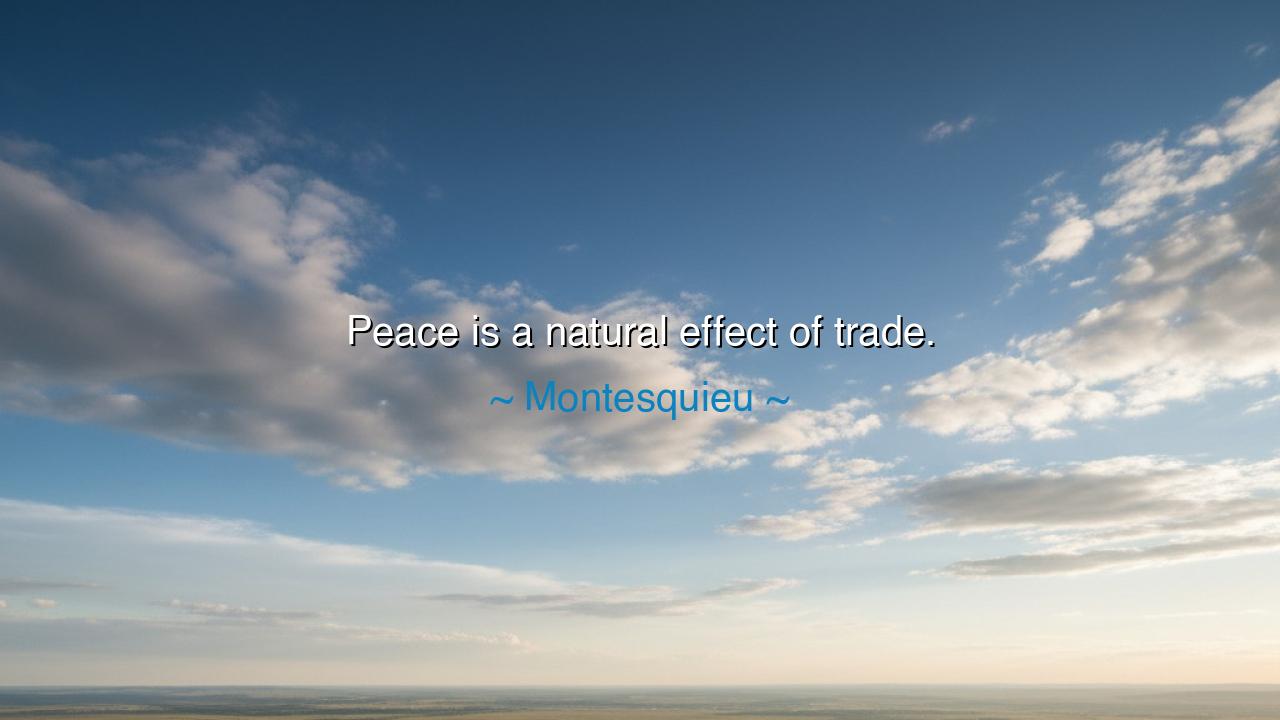
Peace is a natural effect of trade.






Montesquieu, the great philosopher of liberty and law, once proclaimed with piercing clarity: “Peace is a natural effect of trade.” These words, simple yet profound, remind us that human beings, when bound by the exchange of goods, knowledge, and labor, are drawn away from the path of war and set instead upon the path of cooperation. For where there is commerce, there is interdependence; and where there is interdependence, the sword grows heavy while the open hand grows light.
When he speaks of peace as the child of trade, Montesquieu does not mean that men suddenly become virtuous merchants instead of violent conquerors. Rather, he reveals a practical truth: that nations who prosper together through commerce find more to gain in friendship than in rivalry. To kill a trading partner is to kill one’s own profit; to destroy another’s prosperity is to diminish one’s own. Thus, commerce becomes a teacher of restraint, a tutor of peace, not through lofty ideals, but through shared interest and mutual survival.
This wisdom can be seen across the ages. Look to the Silk Road, that ancient artery stretching from China to the Mediterranean. For centuries, it carried not only silk and spices, but also ideas, art, and trust between peoples who might otherwise have known only suspicion. The merchants of Samarkand, Baghdad, and Venice understood that the prosperity of one city enriched another. Though wars flared at times, the road itself endured, a living proof that trade tempers the sword and opens the heart.
Consider too the story of post-war Europe. After the horrors of the Second World War, nations long accustomed to bloodshed sought a different path. They created the European Coal and Steel Community, binding together their industries so that war would not only be unthinkable but unprofitable. From this foundation grew the European Union, imperfect though it is, yet for generations it preserved peace among nations that once devoured each other in battle. Here again, Montesquieu’s insight proved true: commerce, by weaving destinies together, creates a shield stronger than armies.
But Montesquieu’s words also carry a warning. For trade can foster peace only when it is balanced and just. If commerce becomes a weapon of exploitation, if one nation enriches itself by impoverishing another, then resentment smolders and war may once again ignite. Thus, peace through trade demands fairness, respect, and reciprocity. The open hand must not become a clenched fist disguised as generosity. True peace is born not of greed, but of mutual prosperity.
The lesson for us is timeless: in our own lives as in nations, build relationships upon exchange rather than domination. When you give as well as receive, when you seek not only your own gain but the flourishing of others, you create peace in your home, in your community, and across borders. The spirit of trade is not only the exchange of goods but of trust, of respect, of recognizing in others the same hunger for dignity and well-being that burns within yourself.
Practically, this means seeking collaboration over rivalry, dialogue over silence, fairness over exploitation. Support systems of commerce that uplift rather than destroy. And in your daily dealings—whether in business, friendship, or family—remember that peace is not achieved by taking all, but by giving and receiving in balance. For just as nations fall into war when greed overtakes justice, so too do souls fall into conflict when they hoard instead of share.
So, O listener, take Montesquieu’s wisdom as a guiding star: peace is the natural effect of trade. Let your exchanges with others—be they material, emotional, or spiritual—be guided by fairness and generosity. In this way, you will not only prosper but create harmony wherever you walk. For war may be born of conquest, but peace is born of exchange, and it is through exchange that humanity learns it is one.






AAdministratorAdministrator
Welcome, honored guests. Please leave a comment, we will respond soon